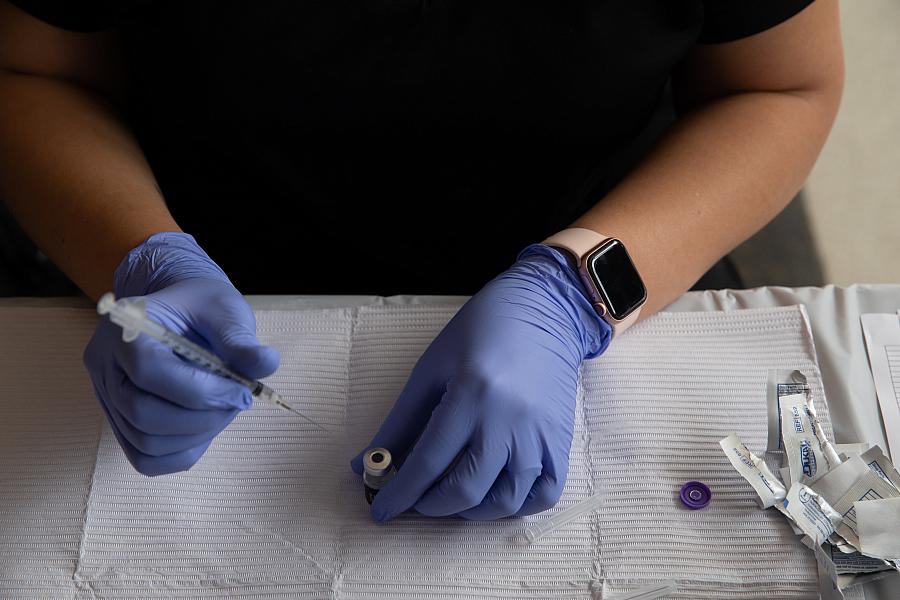Expert panel voices skepticism on need for boosters for most Americans

Antibodies are like the protective force fields that surround the family in the movie “The Incredibles,” explains immunology professor Marion Pepper. Even if a threat breaks through that force field, they can still use their superhero powers to defend themselves.
In the human body, those underlying superpowers are the long-lasting B cells and T cells, which can still mount a strong defense against COVID even if antibodies wane in the months following infection or vaccination. This powerful adaptive immune system, which often gets overlooked in media coverage that overwhelmingly focuses on declining antibodies, is why Pepper isn’t currently planning on a COVID-19 booster shot for herself.
“People have really focused on antibodies and this ability of antibodies to protect against infection when there are really these multiple layers of immune memory that all act together to control the infection,” said Pepper, an associate professor of immunology at the University of Washington, said in a Center for Health Journalism webinar this week.
Pepper was joined by Dr. Dhruv Khullar, a practicing physician and contributing writer at The New Yorker, and UCSF infectious disease specialist Dr. Monica Gandhi to discuss the body’s complex immune system, the risks for the vaccinated, and the latest variants. Speakers expressed optimism that the vaccines are still highly effective and that – at least for now – boosters aren’t necessary for most people with healthy immune systems.
Armies waiting to reactivate
Even though antibodies are waning with time, there are still “all these other layers of cells that can prevent disease,” Pepper said.
When the body encounters a new virus, it creates a multipronged immune response. In addition to antibodies, it develops B and T cells that can last a lifetime. After the first encounter with a virus, memory B cells patrol the body in search of the same or similar virus. If they find it, they’ll rapidly reactivate, controlling the infection quickly. T cells also help with the response.
Most COVID-related immune studies have looked at whether antibodies persist. That’s because antibodies in blood are much easier to study than these other cells that found in many different regions of the body, Pepper said. There’s no doubt that antibodies decrease over time. But that doesn’t mean a vaccinated person is less protected from severe disease as a result.
“Yes, we’re seeing declines in antibodies but there’s this underlying layer of memory B cells that are sitting there that are ready to respond,” she said. “And they’re going to get reactivated and those will control against disease.”
The case for optimism
Gandhi, a professor of medicine at UCSF and San Francisco General Hospital, also voiced confidence the leading vaccines will remain protective against severe disease in people with healthy immune systems for a long period of time. She said she would not get a booster unless her health system requires it, though she recognized the importance of boosters for immunocompromised individuals.
Gandhi said she’s “very comfortable” being around vaccinated people who are asymptomatic.
Vaccinated people who have a breakthrough case will be infectious for a much shorter period of time — the immune response comes online much faster in those who have been vaccinated compared to those with unprepared immune systems — even with the delta variant, she said, pointing to a Singapore study that examined viral loads among people who had and had not been vaccinated. While both groups had similar viral loads at the onset, these dropped more rapidly in the vaccinated group.
Gandhi also pointed to a recent study in The Lancet Infectious Diseases that showed vaccinated people who get a mild COVID infection are half as likely to experience long COVID.
I’m ok, but what about mu?
Right now, mu, a new variant of interest, accounts for a small sliver of cases in the U.S. Delta is still the overwhelming majority, said Khullar, who is also an assistant professor at Weill Cornell Medical College. While there are some suggestions mu has immune-evading properties, we don’t know enough to set off alarms about it, he said.
With any new variant, it’s important to analyze three critical properties, according to Khullar: its lethality, or how likely someone is to be hospitalized or die; its immune evasion, or how likely it can evade parts of the immune system; and its transmissibility, or how likely it is to spread from person to person. Delta, for instance, is much more transmissible than the original wild-type virus that came out of Wuhan.
Greater transmissibility is “really what becomes most problematic,” he said.
For otherwise healthy adults, the vaccines are still sufficiently protective against delta in his view. There’s not “a slam dunk” case that most of the population needs a booster at this time, he said. The attention instead should be on increasing vaccination rates, particularly in lagging regions.
Khullar acknowledged the challenge of the current moment in which even vaccinated people are making tough decisions about risk. It’s no longer as simple as staying home, and the “cognitive load” of constantly assessing relative risks is hefty.
“That’s a taxing thing. What is worth it and what is not worth it?” Khullar said. “It’s a trickier moment than in the past.”
**
Watch the full presentation here:

